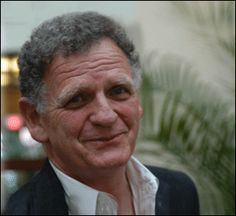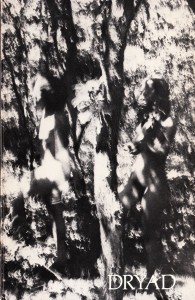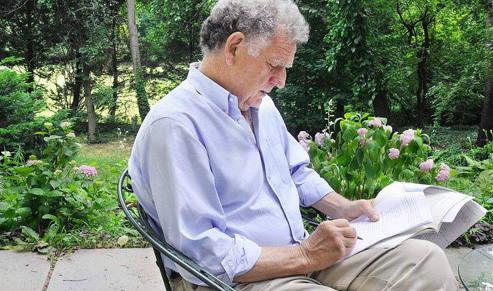Volume 15:4, Fall 2014
A Splendid Wake Issue
Merrill Leffler has always seemed to me to be the perfect blend of enthusiasm and knowledge, often the enthusiasm breaking out into exuberance and the knowledge into wisdom. His education in literary matters has been a mix of significant academic study including a three-year fellowship at Oxford and far more significant personal extensions of that study. As a poet, translator, scholar, editor, publisher, science writer, critic, teacher, book designer, and cultural event pillar, he seemed (and still seems) inexhaustible. Hes the kind of guy who makes time for everything.
I dont think I met Merrill until shortly after he founded Dryad in 1967. Beginning that same year (and for five joyous years thereafter), I shared an office with Roland Flint in the English Department at Georgetown University. Its likely that a connection between Merrill and Roland led to my own connection with Merrill.
Over the next ten years, Dryad flourished, nourishing the literary culture in the Washington, DC area. The periodical publication gradually gave way to Dryad Press, the first publisher of poetry collections by Roland Flint, and over the years an imprint of regional and national importance. Many others in the DC area published with Merrills Dryad Press, which also brought out titles by poets of national and international reputation or notable promise from other parts of the country, such as Rodger Kamenetz, Moshe Dor, and Ann Darr. More recently, the press has published books by Natasha Trethewey and Reed Whittemore.
Dryad Press has published important titles in prose as well as poetry. Co-publication with various university presses extended the distribution range and review possibilities for many Leffler projects, most of these related to Jewish writing and culture. These are issues that have a prominent place in Merrills own poetry and in his translations.
My vantage points on Merrill and his activities shifted during this ten-year period. We were both charter members at the 1976 founding of The Writers Center, along with many other literary seekers and doers, at its original Glen Echo Park location. Merrills contributions through his WC participation greatly enriched the programs and spirit of this literary arts Mecca for decades.
 It may seem odd to speak of the significant role of the United States Naval Academys English Department faculty members in the genesis and development of The Writers Center until one remembers Al Lefcowitz, its principal founder and guiding/presiding spirit for so long. Al was our senior at USNA, and he swept John Hill and myself into this most worthy and congenial operation.
It may seem odd to speak of the significant role of the United States Naval Academys English Department faculty members in the genesis and development of The Writers Center until one remembers Al Lefcowitz, its principal founder and guiding/presiding spirit for so long. Al was our senior at USNA, and he swept John Hill and myself into this most worthy and congenial operation.
Shortly before the birth of the Writers Center, we found ways of having Merrill join us for several years (1975-1977, 1979-1981) as a colleague, helping bring literary culture and writing skills to science- and math-oriented midshipmen. Merrills scientific literacy was a great asset in bridging the great divide between the two cultures so profoundly articulated by C. P. Snow.
Before Merrill was officially named Poet Laureate of Takoma Park, MD his home for decades (and the DC area for half a century) he was certainly that unofficially. He already had been working for many years to raise the communitys consciousness about the value of poetry in everyday life. He promoted poetry and poets at every opportunity, arranging poetry programs and building audiences for local and visiting poets. Takoma Park (and the adjacent Takoma section of DC) became a hotspot for literary creativity and appreciation. Writers, musicians, and visual artists informally support each others efforts. Merrill has been a huge energy force within this creative community.
On a larger scale, Merrill has played a similar part in the greater Washington, DC area. Unpretentiously powerful, he continues to be a role model and exemplar for others.
Of course, these activities publishing, programming, and institution-building have the same thrust: putting readers (or listeners) and writers together. The Writers Center goes one step further mentoring writers. As a publisher, editor, workshop leader, and friend, Merrill is often in a mentorship situation.
From my own experience and the testimony of others, Merrills editorial efforts as a seriously involved publisher made all the difference in bringing our poetry collections to a much higher level than we could have reached on our own. Not only was he a shrewd and sensitive critic, helping us mend individual poems, but he also and this may have been for him a larger concern shared penetrating insights and practical suggestions about the grouping and arrangement of poems.
He was (and still is, judging by his recent collection, Mark the Music) an ardent representative of the school of thought that believes a collection is not a miscellany, but rather a careful orchestration of themes, tones, and techniques. Effective sequences, as well as juxtapositions by contrast and affinity, involve a kind of alchemy of which Merrill is a magus.
 Im holding in my hands Dryad, Numbers 14 & 15, 1977. This long-awaited issue appeared after Dryad Press had taken over Merrills attentive heart. The back cover advertises Dryad Press books and chapbooks by James Wright, Paul Zimmer, John Logan, Denis Boyles, Roger Aplon, Myra Sklarew, Roland Flint (3rd printing of And Morning), Linda Pastan, Frank Dwyer, Roderick Jellema, and a collection of praise for John Berryman edited by Marguerite Harris.
Im holding in my hands Dryad, Numbers 14 & 15, 1977. This long-awaited issue appeared after Dryad Press had taken over Merrills attentive heart. The back cover advertises Dryad Press books and chapbooks by James Wright, Paul Zimmer, John Logan, Denis Boyles, Roger Aplon, Myra Sklarew, Roland Flint (3rd printing of And Morning), Linda Pastan, Frank Dwyer, Roderick Jellema, and a collection of praise for John Berryman edited by Marguerite Harris.
The double-issue is juicy with reviews, translations, and new poems by poets of reputation and talented newcomers. I was proud to be found in it as a reviewer and a poet. I still am. Though Merrill has always been generously eclectic in his tastes, it still means something much, in fact when he finds worth in something youve written.
An example of a Dryad issue that was also released as a book is the collection I edited called Shaping: New Poems in Traditional Prosodies. Published in 1978, it was mailed to Dryad subscribers as Dryad 18/19. A lover of typefaces and book design, Merrill was only following a beloved tradition by letting readers know at the back of the book that it was Set in 10 point English Times at the Writers Center, Glen Echo, Maryland. This kind of information in other Dryad Press books was usually much more elaborate. The physical, designed book has a personality that Merrill wishes to honor.
From Merrill, many of us learned that printers ink came in shades of black, not just black. A dollop of silver in the brew could make all the difference in how ones lines jumped off of the selected paper.
I have not given any attention to Merrills own poems in this little ramble. Its something Ive had occasion to do before (long ago in Poet Lore and recently in Jewish Book World).
Ill close here with the first and last paragraphs of the JBW review of Mark the Music:
As they have always done, Merrill Lefflers poems insist on sheer presence. Bravado and uncertainty dance together, their feet stepping to rhythms of resignation, grief, and merriment. Poetic feet? Often. Measures of experience and meditation? Always. Prose poems and graphic poems? Yes, treasures.
Exploring and inventing approaches to lifes huge questions; exploring older, newer, and novel forms for the journey, Merrill Lefflers generous collection, beautifully designed for the eye and the minds ear, reveals a soul at once self-deprecating and heroic. Although this poet is now an elder, the pulse and juice of youth continues to charge his art; the wisdom has only deepened.
Thank you, Merrill, for your own wonderful poems and for everything else, including those marvelous, caring, richly detailed and considered, and frequently hand-written letters now a bulwark against the terse, telegraphic e-messages that pass for communication in our 21st century lives. Yasher koach.
Philip K. Jason is the author of twenty books, including The Critical Response to Anais Nin (Greenwood Press, 1996); Acts and Shadows: The Vietnam War in American Literary Culture (Rowman & Littlefield, 2000); and Don't Wave Goodbye: The Children's Flight from Nazi Persecution to American Freedom (Praeger, 2004). His "Florida Writers" column appears in Florida Weekly, and his book reviews appear in Fort Myers Magazine, Southern Literary Review, and Washington Independent Review of Books. Jason retired to Naples, FL after a 36-year college teaching career, most of it at the US Naval Academy. For twenty years, Jason was editor of Poet Lore, and for eight years he organized the annual Naples Press Club Authors and Books Festival. To read more by this author: Five poems, Spring 2001
Merrill Leffler is the author of three books of poems: Mark the Music (2012), Take Hold (1997), and Partly Pandemonium, Partly Love (1984). The publisher of Dryad Press, which has been publishing literary books since 1975, he has also guest edited issues of such literary journals as Poet Lore, Shirim, and Beltway Poetry Quarterly. One of the founders of The Writer's Center in Bethesda, Leffler taught literature at the University of Maryland and the U.S. Naval Academy until the early 1980s, and for more than 20 years was a science writer at the University of Maryland Sea Grant Program, which focuses on issues related to the Chesapeake Bay ecosystem. He lives with his wife Ann Slayton in Takoma Park, Maryland, where he served as Poet Laureate, 2011-2018. To read more by this author: Merrill Leffler:Winter 2000 Merrill Leffler's Introduction to "The Distinguishing Voice" Issue, Fall 2000 Merrill Leffler on O.B. Hardison, Jr.: Memorial Issue Three DC Editors: Richard Peabody on Merrill Leffler: Profiles Issue Merrill Leffler on Gabrielle Edgcomb: Profiles Issue
